relationships are activism too
A week back, I posted this on my story:
It was an examination of personal hypocrisies contained in disbalances between belief systems and actual relationships. Before I state my own two cents, I'd like to share some incredible stories I received in response to my ask:
The unique battle between crippling loneliness and shitty partners:
The pain of watching your friendships dissolve in emotional (and often misogynistic) abuse, and how outgrowing these friendships is inevitable to personal growth.
Knowing and forgiving the parts of you dissolved in abusive cycles, and coming back up for air.
Feeling judged for being a bad feminist, but remembering that the bad feminism is, infact, feminism.
Suffering as a result of the gap between supply and demand for feminist men.
I love the way these stories hold so many aspects of identity: the hypocritical feminist, the indifferent friend, the toxic girlfriend, the cautious-lovesick dater. We see ourselves grapple with the wrongness of our standpoints while reinforcing a belief system that teaches us better. We want to witness the entire spectrum of love even though it's riddled with gendered faults because ultimately, we want to be loved ...we want to be seen.
When I brought this conundrum up with my partner, we tried to graph the problem and noticed that heterosexual cosmopolitan women today are stuck between the 'mismatch gap' of high demand/low supply of feminist allyship in the dating pool.
Of course, it's unsurprising that the odds are stacked against us in a patriarchal society- but it is indeed interesting to see how various parts of our identity converge and collide to accommodate this gap. I remember wanting to be my truest self when I was dating around - and the cutting hurt of having to walk away from bad dates because something sexist was said or done. Why, when I was matching my principles, and living my beliefs, was the ride home spent crying? Why was I trying to be a good feminist and an emotionally full-filled woman, knowing I could never truly be either?
Looking back, it seems clear that I was hoping to illuminate a perfect balance, that sweet spot in the middle where my conscience remained unperturbed. I know now, that while relationships are indeed activism, neither is devoid of constant conversation. Both relationships and activism will shed light on your principled and vulnerable selves, at times together and at times in isolation. But the negotiation never stops, in fact, the negotiation is the whole point.
I spent my last relationship holding myself back from correcting sexist standpoints because I wanted to accommodate the love of a man. I played the cool girl, I chuckled at sexist jokes, I held back, I self-erased. And it worked ... until it didn't. If my ex insisted that all his exes were crazy - it was a clear premonition that one day- I too would be the crazy ex. It took years of conflict and loneliness to ultimately bring natural instincts like flinches, scorn, anger, and intolerance to the forefront of my relationships.
Writing this to you, as someone's crazy ex, the question of conflicting identities doesn't tantalize me anymore. Maybe we don't need to compartmentalize ourselves as much as we think we do. Maybe the gold standard is feminist, and the true crazy ex is the entitled product of patriarchy who hadn't an inkling of self-reflection or the audacity to be better.
The woman crying in the car after a bad date, she rightly walked away from, was more than a caricature of self-pity. I guess what I am saying is, that the conundrum of being a heterosexual feminist female in a patriarchal world is inevitable, and navigating it is riddled with hypocrisies. But hypocrisy is only ever a problem if you are trying to justify yourself.
Giving up the idea of absolution in the form of "sweet spots" also meant giving up on the potential a man claimed he had, and embracing the idea that being alone was better. I think we have to take men as they come, and when our gut says a man is trouble we listen to it. We tell ourselves, again and again, that we do not deserve to feel viscerally uncomfortable in places we ought to feel loved. But I hate the false imposition of righteousness on relationships when my own relationships - political, economic, and romantic - are riddled in chaos.
So yes, relationships are activism. Another thing they are is chaos. And both things can be true.
xx,
Srish
Speaking of activism,
I'd like you to listen to this podcast:
I think it’s high time we renegotiate the manner and tone (yes, tone) with which we conduct disagreements on the Internet. By we, I mean those it is supportive of liberal politics and allyship towards causes of gender, caste, etc.
My take away from this episode is that: respectful dialogue is key to fairer, more inclusive politics.
E.g., asking someone to kill themselves before explaining your point sure isn’t a productive conversation, and creates a cycle in which a legitimate desire for empathy and justice is convoluted with emotional/mental harm.
This PSA:
This existential realisation:
And this beautiful poem by Nandini Sen Mehra:

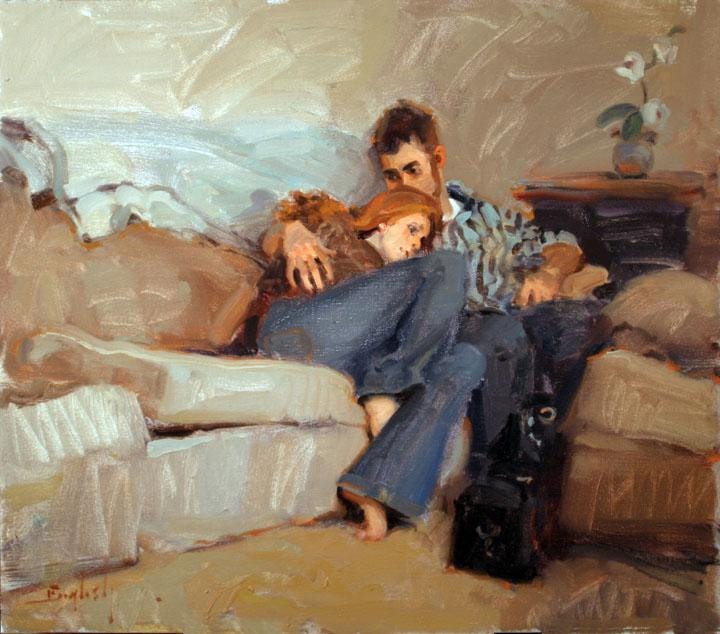
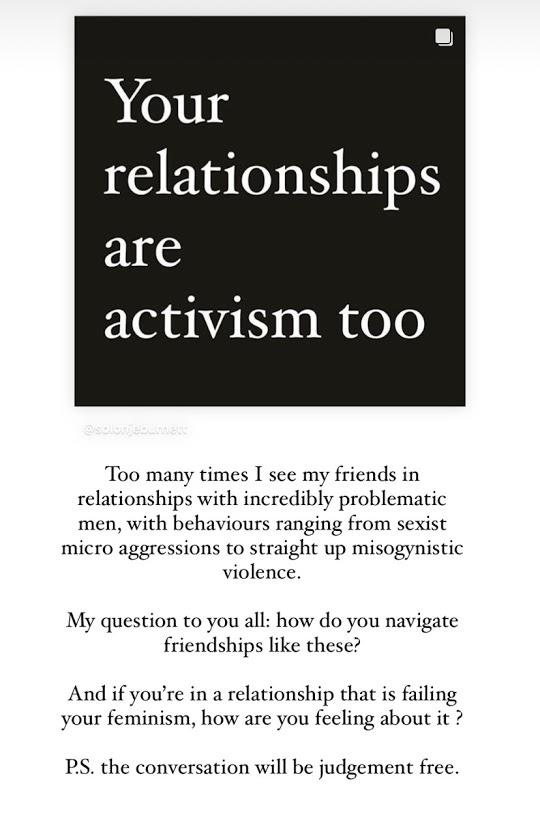
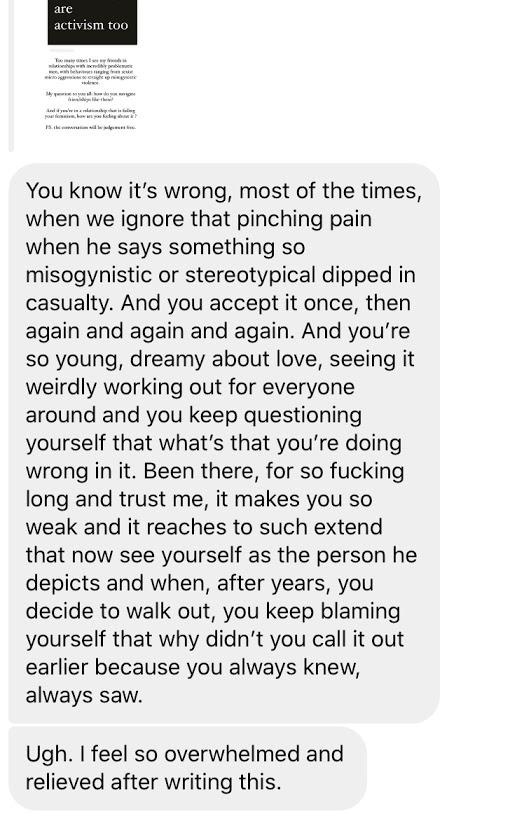
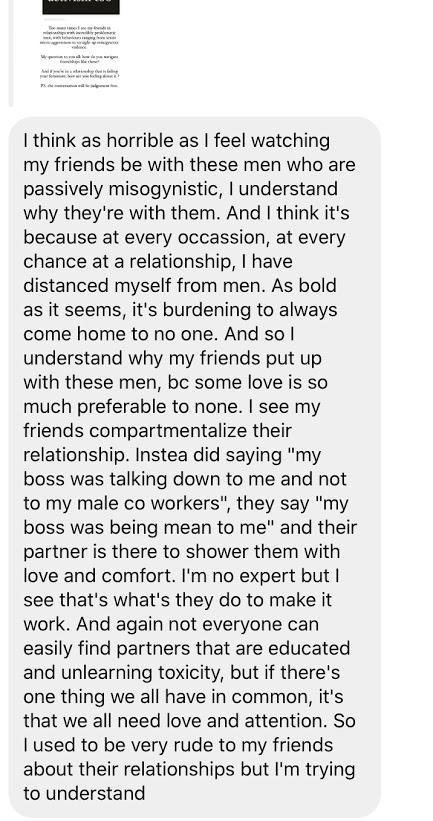
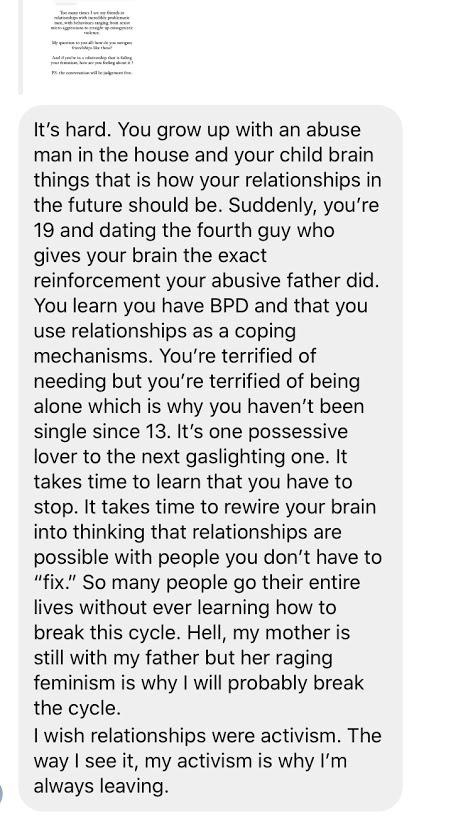
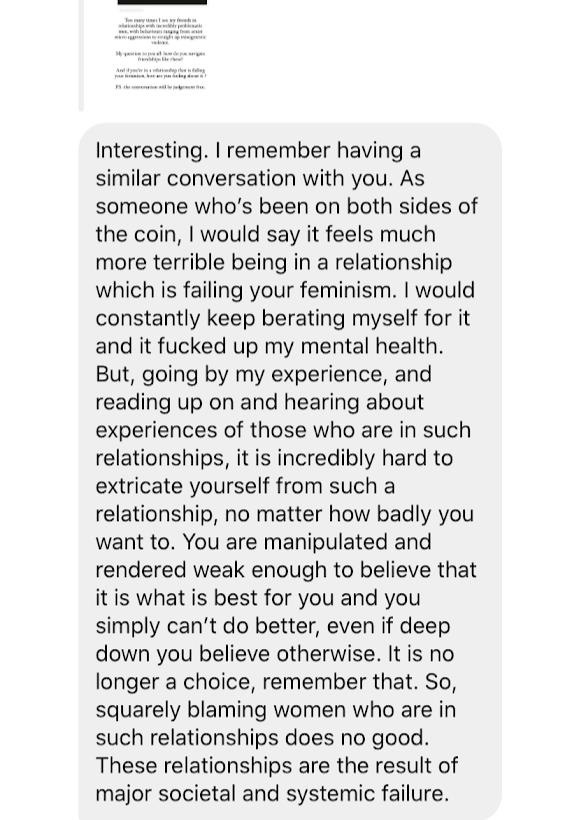
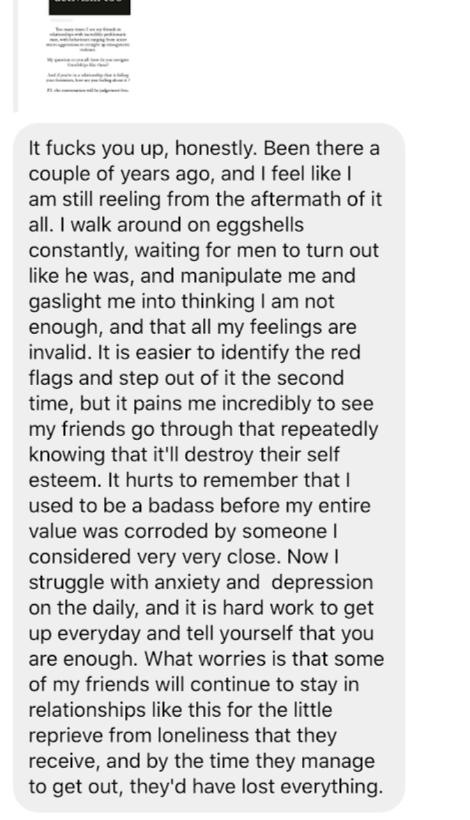
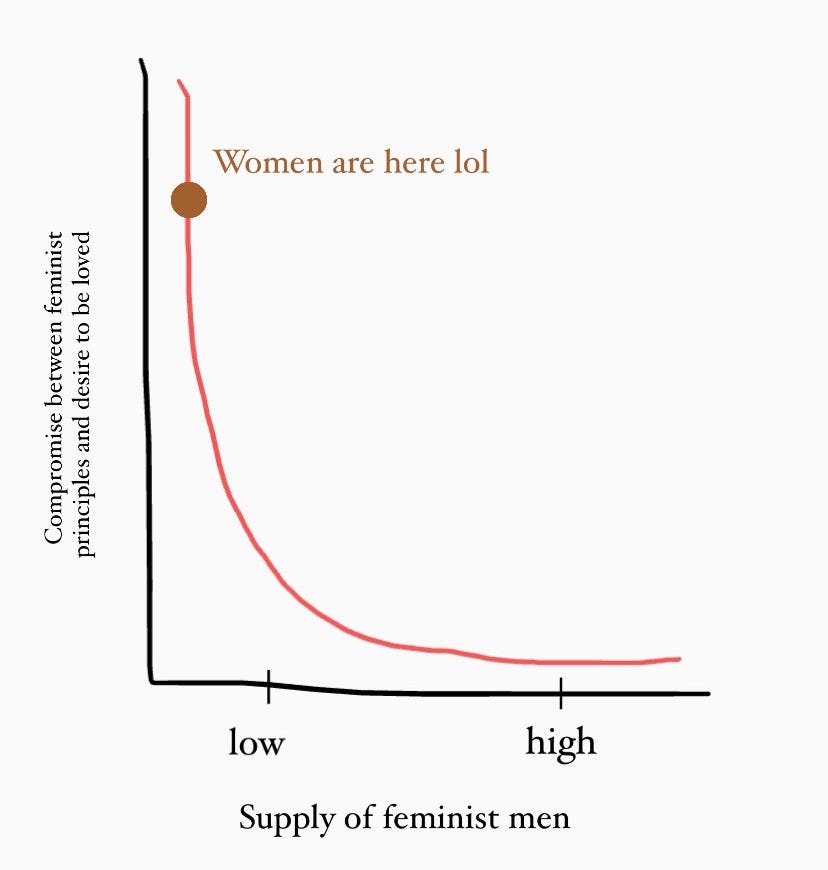
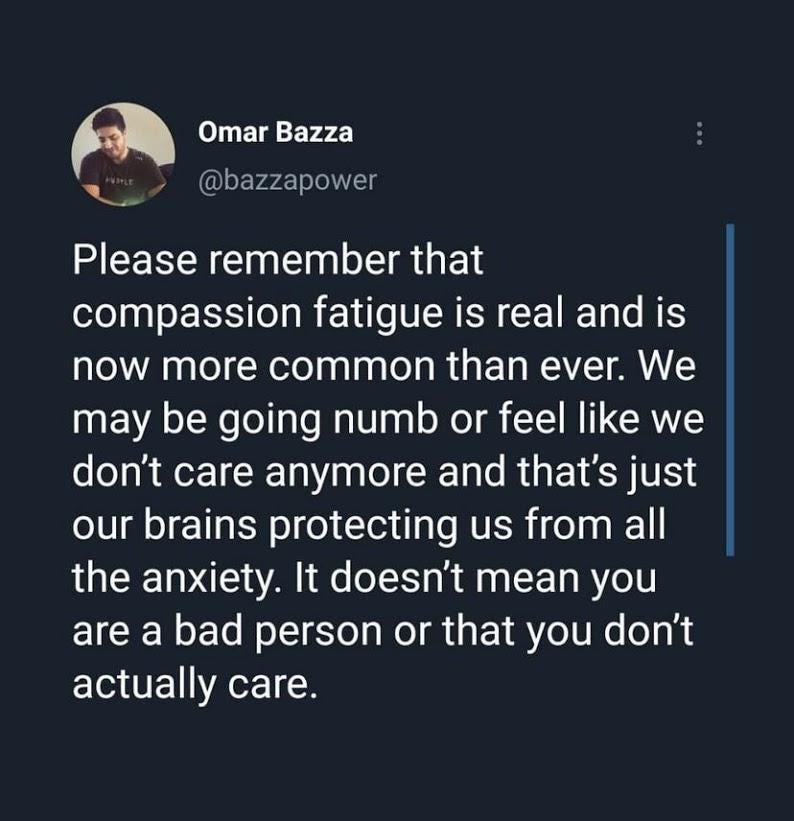
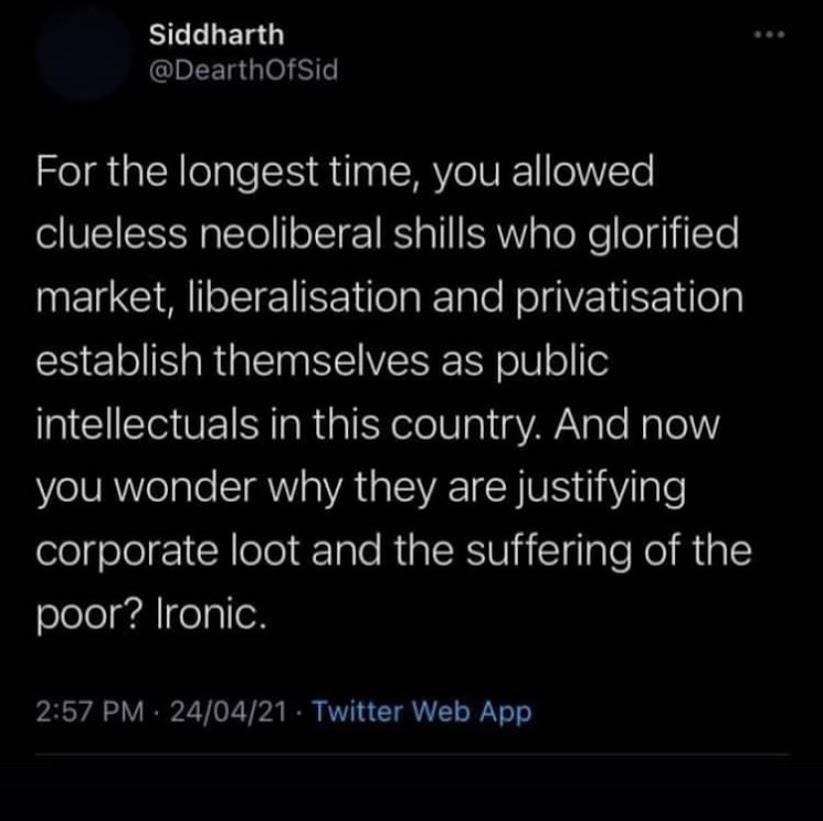
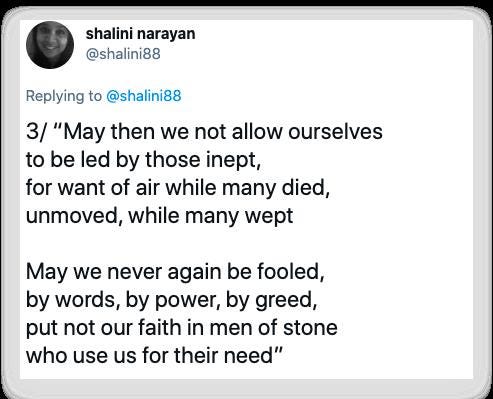
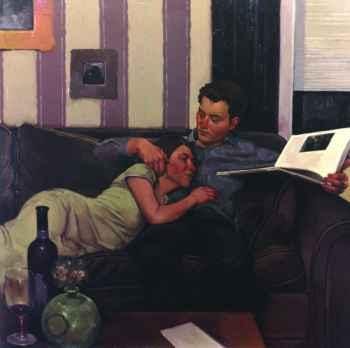
I saw snippets of this post on Srish’s IG and signed up for the newsletter immediately. And now, after reading the whole thing, I’m so so glad I did.
This is a question I’ve constantly dealt with, myself.
“Am I feminist enough if I tolerate casual misogyny and sexism from my significant other? Am I a pseudo feminist for not being stronger and leaving the person who I disagree with? Or am I simply thinking too much and does it not matter at all?”
As my feminism grew to be more intersectional and I became more aware of injustices done to and stereotypes and prejudices perpetuated against different kinds of minorities, I got the answer to my questions. There would never be a way to sustain a relationship where your politics don’t fully agree. There will always be a constant voice in the back of your head questioning your choices every time an argument or conversation throws light on yet another political difference of opinion you hold with your partner. And that, will simply never let you be at peace with the relationship and with the person, no matter how much you love them.
Relationships are activism, indeed, and how!